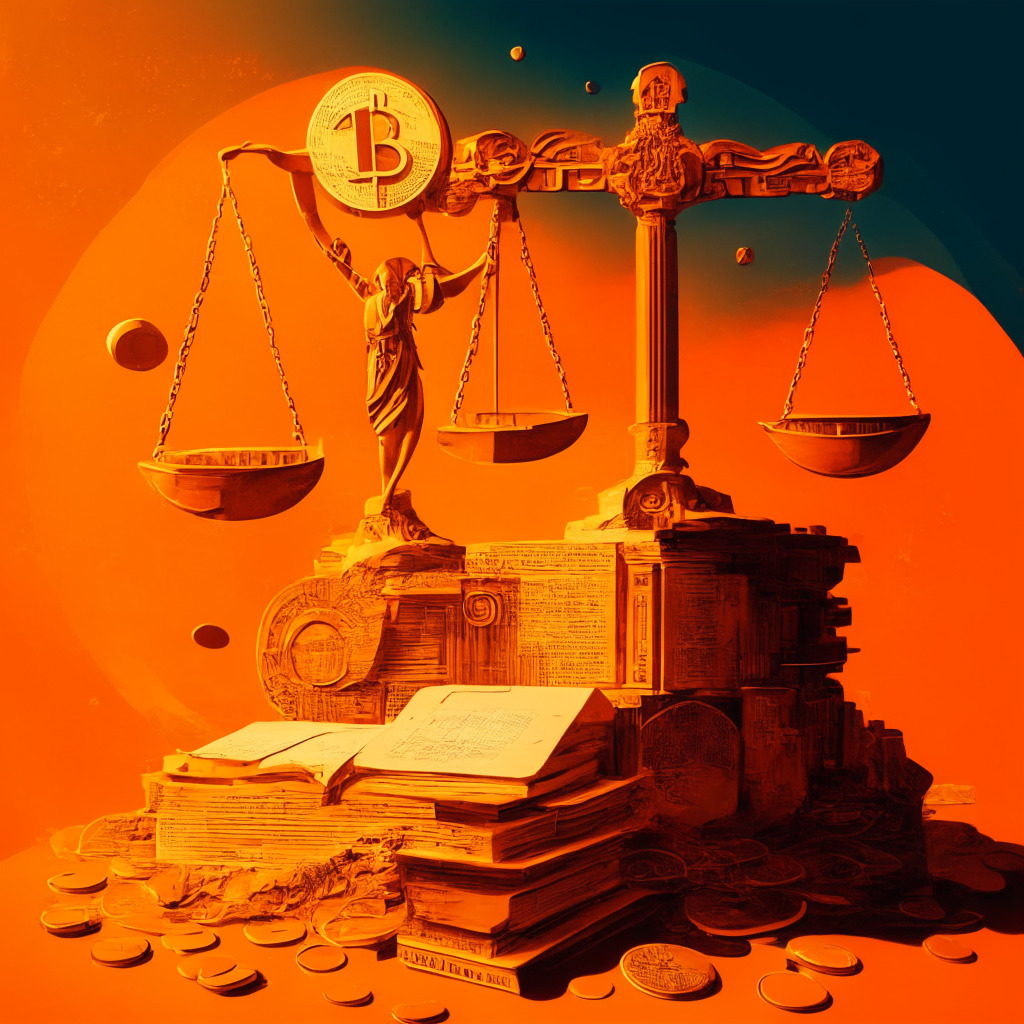BitGo and Swan Bitcoin plan a Bitcoin-only trust company aimed at US institutional investors. The joint venture, still awaiting regulatory approval, proposes to manage Bitcoin custody, administration, and management, eliminating risks from other altcoins. Targeted investors include asset managers, pension plans, family offices and treasuries, emitting increased interest in the sector.
Search Results for: comp
Core Scientific and Celsius Mining: Unraveling a Complex Agreement Amid Bankruptcy Proceedings
“Core Scientific and Celsius Mining, despite their bankruptcy proceedings, have brokered a significant agreement which they believe benefits the wider mining community. The deal, however, doesn’t include Celsius’s convertible notes and awaits court approval to ensure its validity.”
Coinbase’s Layer 2 Blockchain Surpasses Competitors: A Deeper Look into the FriendTech Phenomenon
Coinbase’s layer 2 blockchain, Base, sets record daily transactions, thanks to FriendTech, a decentralized social network platform built on Base. Despite a recent decrease, rekindled Base activity suggests network maturation. This strong start, unaffected by Ethereum’s congestion and fees, could indicate sustainable future growth with “layer-2” networks.
Binance.US and SEC Tussle: A Case of Compliance, Transparency and Potential Risks in Crypto
“The SEC has accused Binance.US of non-cooperation in an ongoing investigation, alleging that the crypto exchange failed to provide necessary documents. Binance.US’s use of Ceffu, wallet custody software, also raised concerns, with SEC fearing the potential diversion of funds abroad.”
SEC Chair Gensler’s Cry for Crypto Compliance: Beneficial Oversight or Harmful Limitation?
SEC Chair, Gary Gensler, warns that compliance issues in the crypto industry could not only damage individual investors, but risk destabilizing the broader financial system. He calls for no overhaul, but believes current laws can address these issues.
Collapse of Three Arrows Capital: A Cautionary Tale in Crypto Regulation Compliance
The collapse of Three Arrows Capital due to Luna and TerraUSD’s slump has affected Singapore’s financial markets. The Monetary Authority of Singapore has barred founders Zhu Su and Kyle Davies for nine years, citing regulatory infringements and lack of transparency. This highlights the importance of regulatory compliance in the volatile cryptocurrency industry.
High-Profile Crypto Trial: Unveiling Legal Complexities and Fault-lines in the Digital Currency Sphere
“This landmark trial against the former FTX CEO, Sam Bankman-Fried, delves into deeper dialogues surrounding the volatile, yet promising world of cryptocurrency. Factors from jury comprehension of crypto trading to assertions of witness tampering indicate the case’s complexity. Notably, it spotlights how traditional jurisdictions significantly impact a decentralised sector.”
Regulatory Scrutiny vs Technological Advancements: Navigating the Complex Crypto Landscape
Despite regulatory challenges and hacking threats, the crypto sphere continues to innovate, with enhanced privacy, user experience, and transaction efficiency. As Ethereum plans a major transformation and Ripple maintains its legal standing, the tokenized assets market could reach $16 billion by 2030. However, effective regulation remains vital to safeguard all stakeholders.
Unraveling the Complex Connection: Interest Rates and Cryptocurrency Volatility
“The U.S Treasury’s increased borrowing is causing speculation about the impact on digital asset prices. Investors may find Bitcoin appealing in a low interest rate regime, pushing up their prices. However, high conventional interest rates could have the opposite effect. Furthermore, fluctuations in interest rates can influence overall market sentiment, leading investors towards safe haven assets.”
Navigating the SEC-Bitcoin ETF Tension: Unmasking the Comprehensiveness of Crypto Diversification
“Multi-asset crypto portfolios deliver superior diversification characteristics when compared to single-token concentration. Broader scope and relative value active management opportunities across Crypto sectors can capitalize on the numerous fundamental uses of blockchain technology rather than relying solely on giant players like Bitcoin and Ether.”
Blending Traditional Finance with DeFi: MetaComp’s Bold Game-Changer in Singapore’s Financial Scene
“MetaComp, Singapore’s digital asset platform, combines traditional finance with decentralized finance, allowing customers to purchase traditional securities with stablecoins. Despite some skepticism due to crypto volatility, the firm believes that fiat-pegged cryptocurrencies will penetrate the real economy.”
Unfolding the Future of opBNB: Layer-2 Protocol’s Promise Amid Market Competition
“BNB Chain developers launched opBNB, a layer 2 protocol enhancing Ethereum’s functionality. The protocol successfully processed 4,000 transactions per second (TPS), significantly higher than Ethereum’s 17 TPS limit. Despite facing a competitive blockchain market, BNB Chain plans network activities and airdrop incentives to attract initial users to the robust, fledgling network.”
FTX Founder’s Legal Battle Sparks Debate on Crypto Regulation Compliance
“The founder of FTX, Sam Bankman-Fried, faces a legal battle that raises questions on the overall regulatory environment in the crypto space. His case highlights the intense scrutiny that key figures in the crypto universe often face, emphasizing the need for clearer, more defined regulations in the burgeoning crypto industry to balance innovation and market integrity.”
Ethereum Co-Founder’s Compromised Account: A Wake-Up Call on Crypto Security
The Ethereum co-founder’s social media account was hacked, with the hacker posting a fraudulent story and a malicious link that resulted in stolen funds totalling $691,000. This incident led to questions about cybersecurity preparedness in the crypto community, highlighting the significant ongoing threat from hacks and scams.
Navigating the US Crypto Regulatory Hurdles: Will Clarity Emerge or Companies Relocate?
The United States’ unclear crypto regulations are driving companies to seek more crypto-friendly countries. Tennessee Senator, Bill Hagerty, supports comprehensive cryptocurrency legislation in the US, replacing the current ‘regulation by enforcement’. He also highlights risks in the unrestricted adoption of Central Bank Digital Currencies (CBDCs).
CFPB’s Scrutiny of Big Tech’s Influence on Mobile Payments: Competition vs Consumer Choice
The US Consumer Financial Protection Bureau (CFPB) is scrutinizing big tech companies like Apple and Google for potentially monopolizing the mobile payments sector and acting as “mini-governments”. This has raised concerns about competition and consumer choice, as CFPB plans to bolster consumer control over personal financial data while promoting open banking and payments.
FCA Extends Crypto Marketing Compliance Deadline: Breathing Space or Consumer Risk?
“The UK’s Financial Conduct Authority could extend the deadline for crypto companies to comply with its marketing rules until January 8, 2024. This move underlines the need for crypto firms to provide transparent and honest marketing. Firms violating regulations could face strict penalties, including suspensions or removal of social media accounts.”
Blockchain Regulation: A Comparative Study of Nigeria’s Leaps and America’s Gains
“The article examines the progress of blockchain regulation from two contrasting perspectives: Nigeria, known for its cryptocurrency-awareness, and the US, with its comprehensive regulatory frameworks. The piece discusses the regulatory challenges in Nigeria and the US’s approach in achieving a balance between enforcement and tech evolution.”
Bankrupt Crypto Lender’s Struggle to Recover Assets meets New Accounting Rules for Crypto-native Companies
The bankrupt crypto lender, Celsius Network, seeks to recover its properties from EquitiesFirst Holdings, following a failed collateral retrieval. Meanwhile, the Financial Accounting Standards Board approves the fair value of companies’ cryptocurrency holdings starting in 2025, generating mixed industry responses.
Regulatory Turbulence in the Digital Seas: Navigating Through the Storms of Crypto Compliance
In the realm of digital assets, regulatory storms pose unprecedented challenges. From accusations against Tornado Cash co-founder, Roman Storm, to the turbulent experiences of former CEOs Alex Mashinsky and Sam Bankman-Fried; and Grayscale firm contesting SEC’s regulations, the unpredictable nature of this digital sea implores for a smart navigation strategy to avoid being swept into the unknown abyss.
Unraveling Blockchain: Introducing Privacy Pools for Enhanced Security and Compliance
Vitalik Buterin and his co-authors introduced novel “privacy pools” in blockchain, addressing privacy issues and crime associated with privacy mixers. These pools utilize zero-knowledge technology to separate honest transactions from unlawful activities, encouraging transparency and honesty in this digitally decentralized environment. The future of blockchain looks promising yet challenging with regard to privacy and regulatory compliance.
Navigating the Complex World of Cryptocurrency Accounting: From Balance Sheets to Tax Compliance
Accounting for cryptocurrencies, void of dedicated standards, is a predominant concern for businesses. The use of different systems, like the International Financial Reporting Standards (IFRS) and Generally Accepted Accounting Practice (GAAP), in cryptocurrency accounting adds to the complexity. Accounting for cryptocurrencies impacts tax compliance, accurate financial reporting and strategic decisions, making clarity, precision, and caution key elements.
Foreseeing a Bitcoin Crash: Comparing Cryptocurrency Trends and Future Stability with Stablecoins
“An ominous Bitcoin price metric that previously resulted in a -25% FTX crash is repeating, centred around the BTC rate of $25,726. Market spectators prepare for a possible drop to $23,000. The Short to Long-Term Realized Value (SLRV) ratio indicates potential sales growth in ‘older’ Bitcoins, urging caution among investors. Meanwhile, stablecoin Circle’s USD Coin (USDC) now supports smooth transitions to Base and Optimism networks.”
Decoding the Complex World of Blockchain through Solana’s Lens: Real-World Solutions and Challenges
Raj Gokal, co-founder of blockchain protocol Solana, is addressing blockchain scalability through decentralized physical infrastructure networks (DEPIN). He emphasizes well-thought-out factors to create a scalable blockchain system. Despite challenges in industries such as real estate, Solana is working towards stable and reliable Web3 infrastructure, critical for institutional adoption. As industry practices evolve, the blockchain future becomes increasingly tangible.
Crypto Market’s Complex Dance: The Rise of Deribit and Shifting Investor Sentiments
“The crypto market performance has been tepid this week with Bitcoin staying below $26,000. Despite SEC revisiting its denial of Grayscale’s ETF bid, other application avenues remain restrained. Deribit, a crypto derivatives platform, saw a 17% surge in trading volume, indicating strong activity in the global crypto options market.”
Shiba Inu’s Potential Recovery and the Rise of Newcomer Sonik Coin: A Comparative Analysis
“The Shiba Inu (SHIB) token’s price has declined notably but shows promising signs of recovery. Increasing trading volumes and high-value transfers hint at growing market interest. With the relaunch of Shibarium, a layer-two network, the SHIB ecosystem’s future could be bright. However, high-risk assets like crypto offer no guarantees.”
Rethinking Crypto Taxation: Japan’s Blockchain Future Amidst Regulatory Complexities
Japan’s Financial Services Agency is looking to change its tax code related to digital assets, potentially eliminating annual tax on unrealized cryptocurrency gains. Advocates argue this could stimulate business and aid blockchain startups, but critics cite possible manipulation and volatility.
Understanding the Implications of Bitcoin’s Overbought Downturn: A Comprehensive Analysis
“Fairlead Strategies predicts an “overbought downturn” for Bitcoin (BTC), hinting at decelerating upward momentum. This correlates with Bitcoin’s continuous inability to surpass the “cloud resistance” at approximately $31,900. Historically, similar downturns precede notable price peaks. Despite this, a long-term neutral bias is suggested by the MACD histogram.”
Robinhood’s $605.7M Share Reclaim: Unraveling The Complex Tale of Bankruptcy and Legal Challenges
Robinhood’s $605.7 million share buyback agreement reclaims shares seized by the US government amid FTX’s bankruptcy—a move linked to SBF’s legal challenges and potential market shifts. It also underscores the intertwined nature of corporate separations, bankruptcy, and legal challenges in the crypto sector.
IBM’s Insights on a Successful Digital Euro Implementation: A Comprehensive Approach
“IBM Consulting offers insights on the successful implementation of a digital euro, emphasizing simplicity for initial adoption, integrating payment intermediaries’ needs, standardizing APIs for seamless integration, and valuing blockchain’s significant benefits. Resilience, transparency, security, and regulatory clarity are the key concerns for an increasingly digital economy.”
Swift’s Blockchain Integration vs Central Bank Digital Currencies: A Comparative Analysis
Swift’s recent report asserts that short-term blockchain integration is a more feasible solution for market development than unifying Central Bank Digital Currencies and tokenized assets on one ledger. It suggests that connecting existing systems with blockchains addresses interoperability issues between diverse blockchain networks, improving efficiency and user experience.
Second Chance for US Crypto Regulations: A Comparative Study of Global Trends
“The US digital asset industry may revive as courts counter the perceived hostility of the authorities. Digital asset lawyer, Jeremy McLaughlin, suggests recent cases weakening SEC’s argument might spark industry resurgence. However, he noted the challenges of such contentious landscape.”































